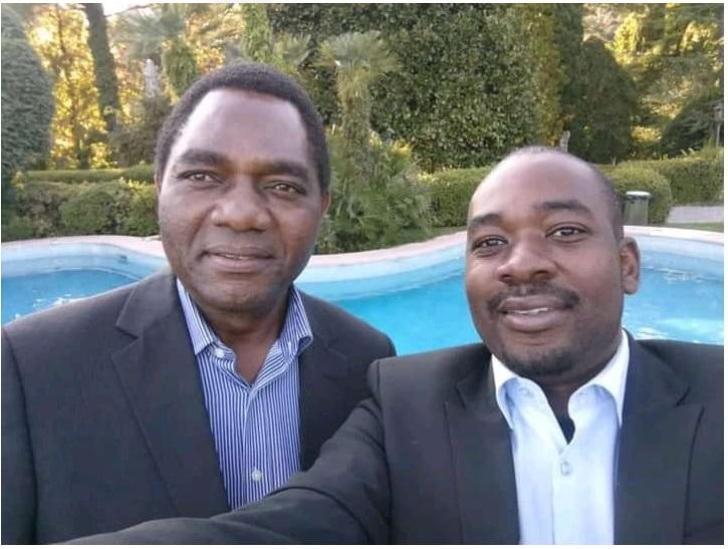News / National
How Mnangagwa - Hichilema relations soured
11 Sep 2024 at 10:53hrs |
0 Views

The strained diplomatic relations between Zambia and Zimbabwe, culminating in Zambian President Hakainde Hichilema's boycott of the recent 44th Sadc summit in Harare, have deep roots tracing back to the 2022 general elections.
Tensions began escalating when President Emmerson Mnangagwa perceived a threat from Hichilema and his ruling United Party for National Development (UPND) due to their close association with Zimbabwean opposition leader Nelson Chamisa. Chamisa's rising popularity ahead of the 2023 harmonized elections unsettled Mnangagwa, who viewed Hichilema's success in the Zambian presidential race as a boost to opposition movements, including Chamisa's CCC, which Mnangagwa suspected of receiving state support from Hichilema.
Zanu PF's concerns were fueled by reports of a meeting between Chamisa and Hichilema in Johannesburg, where they were allegedly discussing funding strategies for the Zimbabwean opposition. In response, Zanu PF sent a delegation led by Obert Mpofu to Lusaka in February 2022, aiming to mend relations. The delegation, which included Simbarashe Mumbengegwi and Patrick Chinamasa, focused on formalizing party-to-party introductions, fostering a fraternal relationship, and addressing mutual local, regional, and international issues, while attempting to isolate the CCC.
Historically, Zambia and Zimbabwe shared a cordial relationship, having been part of the Federation of Rhodesia and Nyasaland from 1953 to 1963. Zambia supported Zimbabwe's liberation struggle, and Mnangagwa even grew up in Zambia. However, relations soured after Zambia's transition to multiparty democracy, with Zanu PF experiencing friction with Frederick Chiluba’s Movement for Multi-Party Democracy, which replaced Kenneth Kaunda's government.
Relations hit a low during Levy Mwanawasa's presidency from 2002 to 2008, marked by clashes between Mwanawasa and Robert Mugabe at Sadc meetings. Relations improved under Michael Sata’s presidency from 2011 to 2014 but declined again during Edgar Lungu's term, which ended in 2021 when Hichilema assumed office.
The latest diplomatic rift intensified following the August 2023 elections in Zimbabwe, which Hichilema, as Sadc chairperson of the troika on defense, politics, and security, oversaw through an observer mission led by former Zambian Vice President Nevers Mumba. The mission's report, critical of the elections for falling short of constitutional and Sadc standards and highlighting issues like gerrymandering, aggravated tensions.
In response, Zanu PF criticized Mumba, with Justice Minister Ziyambi Ziyambi dismissing the observer mission’s findings as outside their mandate. Sadc condemned these attacks, affirming its commitment to fair elections and citing its report’s basis on comprehensive observations and consultations.
Further straining relations, Mnangagwa's recent remarks alleging U.S. militarization of Zambia to isolate Zimbabwe drew sharp criticism from Zambian Foreign Minister Mulambo Haimbe, who rejected the allegations and called for mediation by Sadc and the African Union.
Efforts to mend ties included a visit by former Zambian Vice President Enock Kevin Kavindele to Harare, aimed at resolving the diplomatic spat and lobbying for support for a Zambian candidate for the African Development Bank presidency. However, the situation worsened when Zimbabwean Minister Tatenda Mavetera labeled Hichilema a "security threat," leading Hichilema to boycott the Sadc summit out of security concerns.
Tensions began escalating when President Emmerson Mnangagwa perceived a threat from Hichilema and his ruling United Party for National Development (UPND) due to their close association with Zimbabwean opposition leader Nelson Chamisa. Chamisa's rising popularity ahead of the 2023 harmonized elections unsettled Mnangagwa, who viewed Hichilema's success in the Zambian presidential race as a boost to opposition movements, including Chamisa's CCC, which Mnangagwa suspected of receiving state support from Hichilema.
Zanu PF's concerns were fueled by reports of a meeting between Chamisa and Hichilema in Johannesburg, where they were allegedly discussing funding strategies for the Zimbabwean opposition. In response, Zanu PF sent a delegation led by Obert Mpofu to Lusaka in February 2022, aiming to mend relations. The delegation, which included Simbarashe Mumbengegwi and Patrick Chinamasa, focused on formalizing party-to-party introductions, fostering a fraternal relationship, and addressing mutual local, regional, and international issues, while attempting to isolate the CCC.
Historically, Zambia and Zimbabwe shared a cordial relationship, having been part of the Federation of Rhodesia and Nyasaland from 1953 to 1963. Zambia supported Zimbabwe's liberation struggle, and Mnangagwa even grew up in Zambia. However, relations soured after Zambia's transition to multiparty democracy, with Zanu PF experiencing friction with Frederick Chiluba’s Movement for Multi-Party Democracy, which replaced Kenneth Kaunda's government.
Relations hit a low during Levy Mwanawasa's presidency from 2002 to 2008, marked by clashes between Mwanawasa and Robert Mugabe at Sadc meetings. Relations improved under Michael Sata’s presidency from 2011 to 2014 but declined again during Edgar Lungu's term, which ended in 2021 when Hichilema assumed office.
The latest diplomatic rift intensified following the August 2023 elections in Zimbabwe, which Hichilema, as Sadc chairperson of the troika on defense, politics, and security, oversaw through an observer mission led by former Zambian Vice President Nevers Mumba. The mission's report, critical of the elections for falling short of constitutional and Sadc standards and highlighting issues like gerrymandering, aggravated tensions.
In response, Zanu PF criticized Mumba, with Justice Minister Ziyambi Ziyambi dismissing the observer mission’s findings as outside their mandate. Sadc condemned these attacks, affirming its commitment to fair elections and citing its report’s basis on comprehensive observations and consultations.
Further straining relations, Mnangagwa's recent remarks alleging U.S. militarization of Zambia to isolate Zimbabwe drew sharp criticism from Zambian Foreign Minister Mulambo Haimbe, who rejected the allegations and called for mediation by Sadc and the African Union.
Efforts to mend ties included a visit by former Zambian Vice President Enock Kevin Kavindele to Harare, aimed at resolving the diplomatic spat and lobbying for support for a Zambian candidate for the African Development Bank presidency. However, the situation worsened when Zimbabwean Minister Tatenda Mavetera labeled Hichilema a "security threat," leading Hichilema to boycott the Sadc summit out of security concerns.
Source - newshawks
Join the discussion
Loading comments…

































